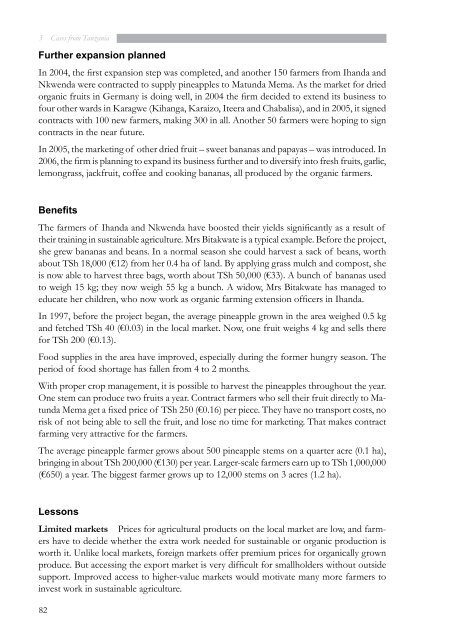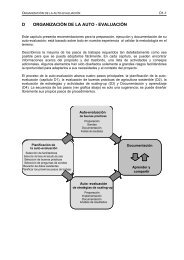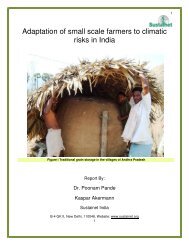cases from tanzania - Sustainet
cases from tanzania - Sustainet
cases from tanzania - Sustainet
You also want an ePaper? Increase the reach of your titles
YUMPU automatically turns print PDFs into web optimized ePapers that Google loves.
3 Cases <strong>from</strong> Tanzania<br />
further expansion planned<br />
In 2004, the first expansion step was completed, and another 150 farmers <strong>from</strong> Ihanda and<br />
Nkwenda were contracted to supply pineapples to Matunda Mema. As the market for dried<br />
organic fruits in Germany is doing well, in 2004 the firm decided to extend its business to<br />
four other wards in Karagwe (Kihanga, Karaizo, Iteera and Chabalisa), and in 2005, it signed<br />
contracts with 100 new farmers, making 300 in all. Another 50 farmers were hoping to sign<br />
contracts in the near future.<br />
In 2005, the marketing of other dried fruit – sweet bananas and papayas – was introduced. In<br />
2006, the firm is planning to expand its business further and to diversify into fresh fruits, garlic,<br />
lemongrass, jackfruit, coffee and cooking bananas, all produced by the organic farmers.<br />
Benefits<br />
The farmers of Ihanda and Nkwenda have boosted their yields significantly as a result of<br />
their training in sustainable agriculture. Mrs Bitakwate is a typical example. Before the project,<br />
she grew bananas and beans. In a normal season she could harvest a sack of beans, worth<br />
about TSh 18,000 (€12) <strong>from</strong> her 0.4 ha of land. By applying grass mulch and compost, she<br />
is now able to harvest three bags, worth about TSh 50,000 (€33). A bunch of bananas used<br />
to weigh 15 kg; they now weigh 55 kg a bunch. A widow, Mrs Bitakwate has managed to<br />
educate her children, who now work as organic farming extension officers in Ihanda.<br />
In 1997, before the project began, the average pineapple grown in the area weighed 0.5 kg<br />
and fetched TSh 40 (€0.03) in the local market. Now, one fruit weighs 4 kg and sells there<br />
for TSh 200 (€0.13).<br />
Food supplies in the area have improved, especially during the former hungry season. The<br />
period of food shortage has fallen <strong>from</strong> 4 to 2 months.<br />
With proper crop management, it is possible to harvest the pineapples throughout the year.<br />
One stem can produce two fruits a year. Contract farmers who sell their fruit directly to Matunda<br />
Mema get a fixed price of TSh 250 (€0.16) per piece. They have no transport costs, no<br />
risk of not being able to sell the fruit, and lose no time for marketing. That makes contract<br />
farming very attractive for the farmers.<br />
The average pineapple farmer grows about 500 pineapple stems on a quarter acre (0.1 ha),<br />
bringing in about TSh 200,000 (€130) per year. Larger-scale farmers earn up to TSh 1,000,000<br />
(€650) a year. The biggest farmer grows up to 12,000 stems on 3 acres (1.2 ha).<br />
lessons<br />
Limited markets Prices for agricultural products on the local market are low, and farmers<br />
have to decide whether the extra work needed for sustainable or organic production is<br />
worth it. Unlike local markets, foreign markets offer premium prices for organically grown<br />
produce. But accessing the export market is very difficult for smallholders without outside<br />
support. Improved access to higher-value markets would motivate many more farmers to<br />
invest work in sustainable agriculture.<br />
82




